Main section
Tabs Navigation
Tabs
2024
Grants awarded 2024
Bedfordshire Archives
The grant will enable the team at Bedfordshire Archives to run a new project called In Step with History. Using a range of records held by Bedfordshire Archives they will research, develop, organise and lead a series of twenty guided walks in five places in the Central Bedfordshire area. The walks will be designed to be accessible and inclusive.
The team will also publish details of this project on their website so that anyone can make use of it for walking or other activities whenever it suits them. Bedfordshire Archives is the record office for the historic county of Bedfordshire, but, being located in the town of Bedford, the team do not always find it easy to engage with those living in Central Bedfordshire. It is their hope that this new way of reaching out to audiences will provide an enjoyable reason to explore a place in a different way, help people to learn more about the history of their place, and inspire them to use the archives to find out more.
Wentworth Woodhouse Trust
 Wentworth Woodhouse, Rotherham, is a Grade I listed mansion and one of the largest houses in Europe, built circa 1725. The house is now owned by the Wentworth Woodhouse Preservation Trust, a registered charity, which exists for the sole purpose of regenerating Wentworth Woodhouse. The house has no original furniture, as the house’s contents were sold in 1948/9.
Wentworth Woodhouse, Rotherham, is a Grade I listed mansion and one of the largest houses in Europe, built circa 1725. The house is now owned by the Wentworth Woodhouse Preservation Trust, a registered charity, which exists for the sole purpose of regenerating Wentworth Woodhouse. The house has no original furniture, as the house’s contents were sold in 1948/9.
The Trust does, however, retain an archive of photographs, letters, books and objects. The content of the archive has, until now, not been widely shared with visitors. The National Archives Engagement Grant will provide a first opportunity for Wentworth Woodhouse to share stories locked in the archives, connecting community and visitors to this historic place.
Victoria Ryves, Head of Culture and Engagement said, “We are really pleased to be awarded Engagement Grant funding. We are excited to experiment with the ways we tell our unique story in the mansion – digitally, creatively and through our archival objects”.
The project will work with research volunteers and a newly formed youth panel to share place-based stories, as well as provide public access to the archive for the first time.
York Business Improvement District
‘Outside the Box’ is a partnership project between York Business Improvement District (BID), York Explore Library and Archives, and York Civic Trust. The project involves celebrating York’s expansive and internationally significant stained-glass archives by transforming 10 BT exchange boxes in York into vibrant works of art.
Rachel Bean, Project Manager at York BID, said: “We’re delighted to have been awarded this grant to help us celebrate the city’s expansive stained-glass archives in a visually impactful and accessible way. The project will bring this collection to life in a whole new way by putting them in the context of place, transforming the look and feel of the street and serving as a permanent reminder of this remarkable art form.”
Inmans Helping Hands
The Hedon Museum and Inmans Primary School are embarking on a collaborative project to develop a bespoke educational package focused on our local area’s history.
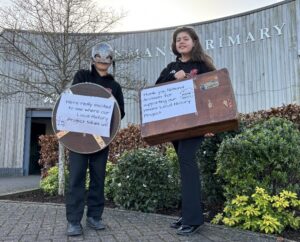
Together, the Hedon Museum and Inmans Primary School will create an engaging program that explores the rich heritage of their community. From local events to modern-day events, students will have the opportunity to delve into the area’s past and discover its unique stories.
The partnership are especially excited to explore a project based upon the Great Fire of Hedon and the Pingsdorf Pot.
Under the guidance of museum experts and educators, students of Inmans Primary School will participate in hands-on activities, workshops and immersive experiences designed to spark curiosity and foster a deeper appreciation for history.
This partnership highlights the importance of investing in education and heritage preservation.
Our Year 6 History ambassadors have said, “We just wanted to say a huge thank you to the National Archives for making this happen. We can’t wait to dive into history thanks to you!”
The Story at Mount Oswald
The Story, a brand-new cultural venue and register office for Durham and the wider county opening on 14 June, will be housed in the recently restored Grade II listed Mount Oswald manor house. The house has been extended to incorporate a purpose-built, contemporary building to house five of the county’s historic collections.
The Story will be the new home for Durham County Record Office, with state-of-the-art facilities for users to access collections dating from 1122.
The National Archives Engagement Grant will fund a project – My Neighbourhood Story – telling stories from across the county using the archive collections soon to be held at The Story.
Councillor Elizabeth Scott, Durham County Council’s Cabinet member for economy and partnerships, said: “We are thrilled to receive the National Archives Engagement Grant which will enable us to share our collections with wider and more diverse audiences across County Durham.
“The My Neighbourhood Story project will work with residents in three very different areas of County Durham to tell the stories of the places that hold significance to them, using our archive collections. We anticipate that the impact of the project will be that more people, specifically people who traditionally have not engaged with heritage, will become aware of The Story’s collections, and develop an interest in local history.
“We hope that the project will enable participants to develop a greater understanding of the place that they call home, their own story and place within it, and the significance of their locality in the history of the wider region. We are excited to get started on the project and extend our thanks to the National Archives for their support with this work.”
Essex Record Office
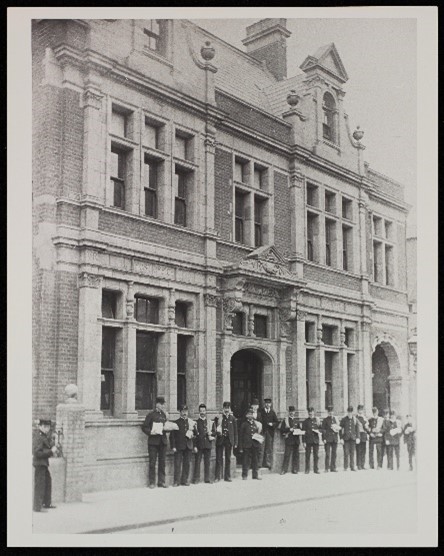
– General Post Office, Weston Road, Southend, c.1900 (Essex Record Office TS 168/56)
This project will explore the history of the D/deaf community in Southend-on-Sea through a series of accessible workshops, co-led by the Essex Record Office (ERO) and the artist Damien Robinson. Historically marginalised and officially discouraged from communicating in their preferred language, D/deaf people have created and repurposed social spaces to gather and connect. Essex Record Office will take the history of two of these spaces – the St Mellitus Centre and The Last Post pub – as a starting point to share, record, and preserve stories of Southend’s D/deaf community.
It is especially important to record these stories now, during a time of change for the St Mellitus Centre and a significant period of D/deaf activism and awareness nationally. The team also hope that the project will be an opportunity for participants to connect to other people and their local area, and for the ERO to better understand potential barriers to engagement with archives.
“The archives held at the Essex Record Office are a hugely important part of the county’s history and I am delighted that we have secured this funding so that we can record and share D/deaf histories which are an important part of the public record.” – Councillor Mark Durham, Cabinet Member for the Arts, Heritage and Culture at Essex County Council
Tower Hamlets Local History Library and Record Office
Tower Hamlets are collaborating with Studio Futurall to deliver a pop-up public engagement activity to connect Tower Hamlets residents with archival material on the local history of changemaking. This project will build on Futurall’s previous work, The Changemaker’s Guide.
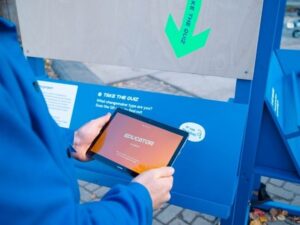 The project uses nine different ‘changemaker’ types, each describing a different way to make change in a local area. Visitors will take a quiz to tell them what kind of changemaker they are, before learning about a historic local changemaker with a similar approach to changing the world. The team believe that when people are more connected to their place, they are more inspired to care for and fight for it; learning about roots fosters belonging.
The project uses nine different ‘changemaker’ types, each describing a different way to make change in a local area. Visitors will take a quiz to tell them what kind of changemaker they are, before learning about a historic local changemaker with a similar approach to changing the world. The team believe that when people are more connected to their place, they are more inspired to care for and fight for it; learning about roots fosters belonging.
2025
Grants awarded 2025
Aunt Nell
Aunt Nell Ltd is an independent podcast production company that will use their engagement grant to delve into the archive of Press for Change, which started fighting for trans rights in the 1990s, and commission four trans sound artists.
Tash Walker, Director of Aunt Nell Ltd, says: “We’re thrilled to receive this grant to support us in making a unique sound installation about UK transgender history. The work will connect us all to UK trans history, through the power of sound and memory, bringing a pivotal archive out into the open.”
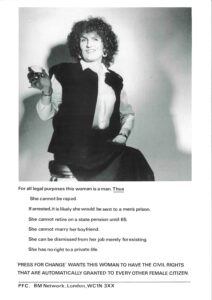
Equal Arts
The engagement grant will enable the team at Equal Arts to run a new project called ‘Creative Newcastle and the Crawhalls.’ The team will be working with people living with dementia and carers to co-develop a set of dementia-friendly reading resources inspired by the Crawhall collection at Newcastle City Library.
Douglas Hunter, CEO for Equal Arts, says: “People living with dementia often stop reading because conventional books are too complex in terms of content and narrative, but archival documents such as letters, when curated in the right way, can offer a satisfying reading experience which stimulates curiosity and imagination without cognitive overload. We are grateful to The National Archives for enabling this work, which forms part of our wider Reading with Dementia programme with Newcastle Libraries, supported by Arts Council England.”
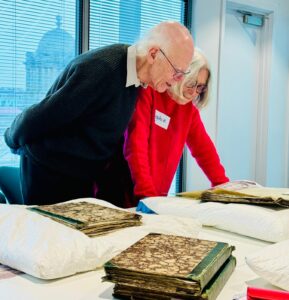
Flintham Museum
The Flintham Museum will be launching a project based on the unsold contents of Whites Stores in Flintham, Nottinghamshire, which were discovered in 1990. This includes hundreds of documents and items about food rationing from 1940-1954. Using documents as a starting point, the project will look at how Flintham residents ate during difficult times. Activities based on food during three time periods (1940-1954, 2020, and in the future) will be organised for all age groups.
Firstly, ration books will be distributed to 250 households and residents will be invited to devise recipes using foods available during and just after World War Two. Secondly, memories of shopping and eating during the 2020 Covid lockdown will be captured for future generations to discover. Finally, people will be invited to think about what they would eat in the event of a future conflict by partaking in local walks led by a professional forager. Through these walks, unexpected foods in and around the village will be found, gathered and turned into edible items for people to take home and eat. The project will end with a community picnic when locally made food reflecting the three time periods will be prepared and shared.
Susan Clayton, the museum’s volunteer curator, says: “Acquiring, preparing and eating food is something we all do every day but we rarely think about how previous generations coped when food was scarce or actively consider what we would do if there was a future conflict which affected food supplies. We reckon this project will encourage us to look backwards and forwards and think differently about an everyday activity.”

Museum of Youth Culture
Camden Calling is an exciting new partnership between the Museum of Youth Culture, Camden Local Studies & Archives Centre and London Borough of Camden. Welcoming two major milestones, Museum of Youth Culture opening its first permanent space in Camden and the borough celebrating its 60th birthday, Camden Calling will invite an artist into the archives to uncover untold stories with the local community. Alongside a series of community archiving events, the artist will co-produce a piece for the public realm.
Jon Swinstead, Founder for Camden Calling, says: “as we prepare to open the world’s first Museum of Youth Culture in Camden, it is vital that our archive speaks to the local community. This project enables us to champion Camden’s rich history and start to directly engage the community in how they want their stories to be told.”
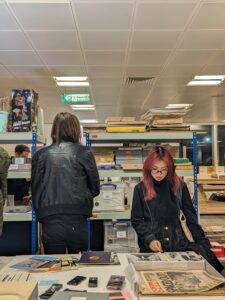
Wigan Council
Archives: Wigan & Leigh will offer seven to eleven year olds in their local area a chance to engage with archival collections through digital workshops. This project, delivered in partnership with education company Computer Xplorers, will be comprised of eight sessions across the 2025 Summer holidays.
Councillor Chris Ready, cabinet portfolio holder for communities at Wigan Council, says: “this successful funding bid will help us to bring our heritage to life for local children this summer holidays. As part of our popular holiday activities, young people will have the opportunity to explore our archive collections and build their skills in stop motion animation, video making and more.”
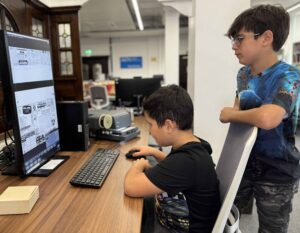
Mulberry Bush Organisation
Mulberry Bush Organisation will use their grant to roll out archives-based workshops to different settings within the care sector. The workshops, co-produced alongside care-experienced adults, will be informed by archival examples of care records which will form the basis for redacted poetry and creative writing.
Debra Doggett, Senior Archivist, says: “We are thrilled to receive this Engagement Grant from The National Archives. This will help us to highlight the voices of care-experienced adults and tell us more about what it’s like to be at the receiving end of the recordkeeping process.”
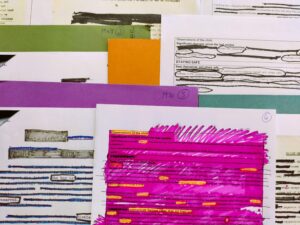
Cornwall Council
‘We are Cornwall’s communities’ is a collaborative project between Kresen Kernow, Cornwall’s archive centre and disAbility Cornwall on behalf of Cornwall Lived Experience Partnership (CLEP). The aim of the project is to work with community members to co-curate an exhibition at Kresen Kernow for the summer of 2025. The exhibition will explore what members of CLEP feel is important about Cornwall’s past and will involve archive stories that can inform a positive and inclusive future in Cornwall.
Alice Howard, Interpretation and Participation Lead, says: “We are really excited that this grant enables us to work with disAbility Cornwall on this exciting exhibition and offer paid opportunities to community members to get involved in archive curation”.
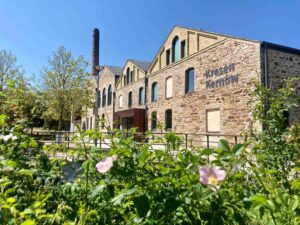
West Yorkshire Archive Service
West Yorkshire Archive Service will work with the South Asian community in Wakefield to share, promote and better understand local collections. The funding will enable them to reach out to hyperlocal audiences around West Yorkshire History Centre in Wakefield and support them to explore stories within the archive’s collections relating to their unique histories within Wakefield. They will also celebrate South Asian History Month (SAHM) in July and August 2025 with a number of outreach activities and creative opportunities to explore archive collections.
Councillor Melanie Jones, Chair West Yorkshire Joint Services Committee, says: “This project will allow us to explore new ways of joint working and of co-curating with our local communities to develop a deeper understanding of our collections and the community stories embedded within them. Archives are the keepers of stories. By sharing and preserving the stories of Wakefield’s South Asian community, we can help make existing collections more accessible to diverse communities, helping to enrich our heritage and make it more representative of the people of Wakefield.”
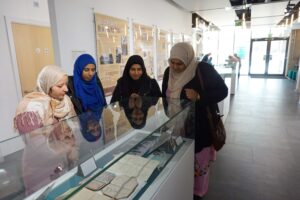
Oxfordshire Health Archives
The Oxford Health Charity, the Oxford Health Arts Partnership and Oxfordshire Health Archives will mark the bicentenary of the Warneford Hospital in 2026 with their project, ‘Warneford 200’. The engagement grant will fund a series of creative workshops for users of mental health services and members of the local community to be held in Oxford, Banbury, Woodstock, Didcot and Abingdon.
During the workshops, which will be led by an artist from the Oxford Health Arts Partnership, participants will be asked to respond creatively to stories about the Warneford over the past 200 years, and to materials from the archives. Their artwork or creative writing will be included in the Warneford 200 exhibition, planned to tour Oxfordshire during 2026.
Dr Karl Marlowe, Chief Medical Officer, Oxford Health NHS Foundation Trust, says: “We are immensely grateful to The National Archives for supporting this project. This will bring the history of the Warneford Hospital to contemporary life and highlight the importance of the creative therapeutic link to mental health.”
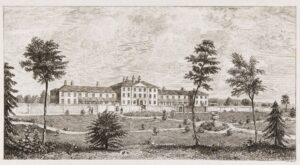
OHA WP 57. An engraving of the front of the Warneford Hospital (then known as the Oxford Lunatic Asylum) published by J. Fisher in 1824; this became the back of the hospital in 1877.
Gressenhall Farm and Workhouse
This project will explore the little-known history of Gressenhall Farm and Workhouse’s site during 1945, focusing particularly on local lived experience, to coincide with the anniversary year of VE and VJ Days. The research that volunteers will undertake, with expert training from the Norfolk Record Office (NRO), will directly inform two public engagement events, highlighting the impact of this specific moment in history and social changes for Norfolk in the period.
The project will provide an invaluable opportunity for volunteer and staff training through NRO’s expertise and facilitate the creation of a robust research pack for ongoing use and extended project legacy – including up to four biographical profiles, shared through costumed interpretation to bring local history to life.
Fiona Ashley, Events Officer, says: “The project aims to humanise the past and offer visitors a more authentic, research-driven perspective, as well as bridging the gap between more academic resources and the audiences who visit Gressenhall Farm and Workhouse with interest in this material but without the skills, confidence or awareness of where to find it. This project will seek to further expand access to and use of the Norfolk Record Office’s wealth of ‘stories’, encouraging engagement with our county’s diverse audiences.”
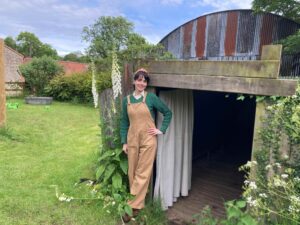
Take Shelter
Take Shelter is a small charity that runs the only wartime school air raid shelter open to the public in the south of England. Their project will focus on civilian VE celebrations in Brighton and Sussex and the military experience of the soldiers of the Royal Sussex Regiment serving in the Far East in VJ Days. It will also look beyond the Second World War to the ways we mark service today including Armed Forces Day and Remembrance.
They will work in partnership with Mass Observation Archive, West Sussex Record Office and the Royal Sussex Regimental Museum, drawing on their archives and bringing together stories in innovative new ways. The project will create an online resource pack for primary schools in consultation with local schools, an exhibition of pop banners which can be used on-site at the shelter and as outreach and digital assets which can be enjoyed via the Take Shelter touchscreen terminals by both school and community visitors.
Michael Button, Chair of Take Shelter, says “we are very aware that those who lived through the war will soon no longer be with us. We are looking forward to bringing together the wartime voices from the archives so we can share them with our visitors and encourage them to reflect on what celebration and commemoration meant at the end of the Second World War and what it means to them today.”
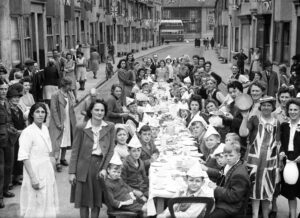
VE Day Street Party on St Paul’s Street, Brighton, 1945 (reproduced courtesy of Brighton Museum)
Spectacle Media
Spectacle Media formed the Silwood Community Video Group in 2001 which has since documented over 350 hours of footage on the social and environmental impacts of regeneration on the Silwood Estate, Rotherhithe.
With this grant, Spectacle Media will run collaborative editing and participatory cataloguing sessions for Silwood community members as part of a Participatory Video Archive Workshop. Engaging with the archive, participants will “crowd catalogue,” working together to create multiple access points to the material from a community-centred perspective. Participants will guide the editing process, helping shape a narrative that preserves Silwood’s history and strengthening community cohesion through a “bottom-up” approach. They will also co-create films, using a participatory filmmaking model that emphasises shared responsibility and skills development. Through digital tools for group decision-making, video editing, and storytelling, participants will use video as a medium for advocacy and local history exploration.
Doreen Dower, 40 years secretary of the local tenants and residents association, says: “We need this project, too many people don’t know what happened in the past. After the regeneration there were people left but no community. This project might help bring a divided community together.”
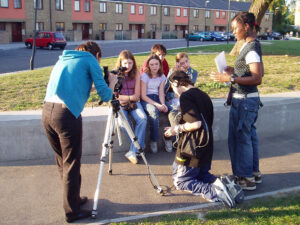
OLYMPUS DIGITAL CAMERA